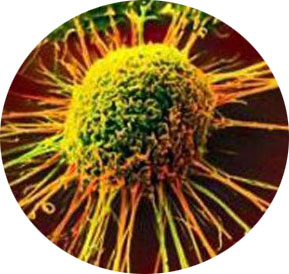|
Genetic mutations in rare cases of bowel tumours
Researchers have identified genetic mutations affecting the immune system which
may lead to the development of more than one bowel tumour at the same time.
Understanding how these cancers develop could improve targeting of therapies,
according to the study published in Nature Communications.
Most people with colorectal cancer will develop one primary tumour, which may
then multiply and spread. However, in around two to five per cent of colorectal
cancer cases, two primary tumours will originate and develop independently,
known as synchronous colorectal cancer.
Cancer
 The study, led by researchers from King’s College London, investigated whether
the synchronous tumours had the same or different mutations and what genetic
alterations could be predisposing people to develop more than one colorectal
tumour. They analysed 20 synchronous colorectal cancers from 10 patients, and
compared their genetics to people with only one colorectal cancer and to healthy
people. The study, led by researchers from King’s College London, investigated whether
the synchronous tumours had the same or different mutations and what genetic
alterations could be predisposing people to develop more than one colorectal
tumour. They analysed 20 synchronous colorectal cancers from 10 patients, and
compared their genetics to people with only one colorectal cancer and to healthy
people.
The genetic analysis found the synchronous tumours were not related to each
other - they contained a variety of different genetic mutations that had led to
cancer. This genetic variation makes synchronous colorectal cancers more
difficult to treat, because therapies targeted at specific genetic aberrations
in a person’s cancer may not work if the other tumour has different genetic
mutations.
Researchers also found synchronous colorectal cancer patients had a higher
occurrence of inherited damaging mutations in immune-related genes.
Three-quarters of synchronous colorectal cancer patients were found to have rare
damaging mutations in genes related to immune system function.
These patients had differences in the composition of their gut immune cells,
which could lead to inflammation in the gut. The study authors conclude that
synchronous colorectal cancer patients have inherited damaging alterations of
immune-related genes, which may cause an inflammatory environment in the gut and
increase the frequency of independent cancer-initiating events.
Dr Francesca Ciccarelli, senior author from the Division of Cancer Studies at
King’s College London, said: ‘Between two and five per cent of all bowel cancer
patients develop more than one primary tumour, called synchronous tumours. Prior
to this study, it was unclear whether these multiple tumours started because of
the same faulty genes. Now we know that these tumours are as different as
cancers from two different people and patients inherit mutations in genes of the
immune system that potentially have damaging effect. These mutations are usually
very rare in healthy people, but they occur at a much higher frequency in this
patient group.
Resistance
‘Currently, colorectal cancer patients with synchronous tumours receive the same
type of treatments as other cancer patients, but we now know that each of their
multiple cancers are likely to respond to therapy and develop resistance in a
different way.
- MNT
|

